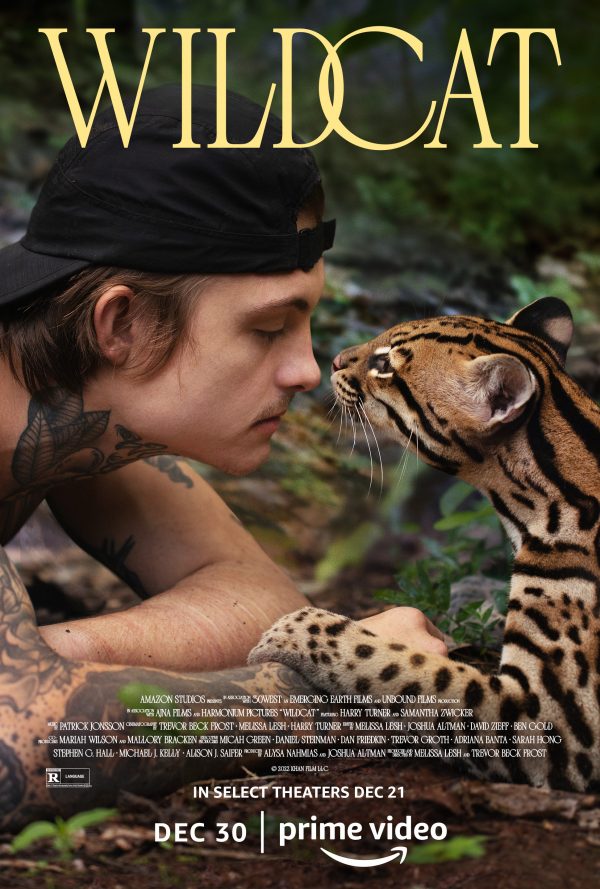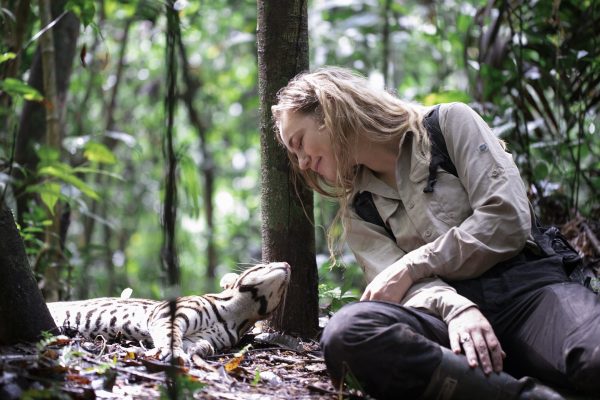‘Wildcat’ opens the door to a new future

“Wildcat” (2022). Cast: Harry Turner, Samantha Zwicker, Jayden Turner, Mark Turner, Colette Turner, Khan, Keanu. Directors: Trevor Frost and Melissa Lesh. Web site. Trailer.
Once in the rainforest, he was taken with the sheer beauty of his new environment. He even landed a job rescuing orphaned wildlife, working with conservationist/scientist Samantha Zwicker, who eventually became his partner. Harry was particularly passionate about a program to prepare abandoned ocelots for return to the wild, a project that gave him a purpose and a new reason for living. He sought to teach the rescued cats how to survive in the wild, independent of human care and support. And, given his experience in the wilds of the battlefield, he was well suited to the task. Simultaneously, though, it gave him a chance to provide much-needed nurturing to the wild beasts, something that helped him heal his own wounds.
The benefits of this experience helped Harry to get over the pain he experienced during the war. The fact that he was able to help his feline friends, Khan and Keanu, enabled him to overcome the anguish he experienced in response to the death of Afghan citizens who were killed right in front of him, innocents for whom he was unable to do anything. These memories haunted him severely and for a long time afterward, but his efforts at helping the jungle cats provided him much comfort in coming to terms with those wartime tragedies – and confirmed that he was indeed able to be of service to those in need.

However, even with the fulfillment and healing this experience provided, Harry still struggled with his mental health demons at times, especially when the challenges of helping the ocelots became too great. This was most apparent when it came time to cut the attachment cord. While Harry knew that this inevitability would eventually surface, he found it difficult to let go. Ironically, at the same time, he became exasperated whenever the cats refused to let go of him, leaving Harry feeling as though he had failed at achieving his ultimate goal of being able to train them for survival on their own in the wild.
The distress of these events put a strain on Harry’s relationship with Samantha. She struggled to provide comfort and support as the progress at restoring his mental health began to unravel. In addition to their professional and romantic partnership, Samantha also served as a de facto therapist to help him get back on his feet. But there was only so much she could do, and, as their relationship continued to deteriorate, these developments threw circumstances into serious jeopardy, both for their future together and for Harry’s psychological well-being, not to mention the continued viability of their wildlife restoration program.
Harry wasn’t the only one battling personal demons in this scenario. Samantha’s struggle to help Harry was an attempt to reconcile her feelings toward her late father, who battled alcoholism. Through her relationship with Harry, she could relate to the pain of her dad, someone she desperately wanted to help but couldn’t. The parallels between Harry and Samantha’s father were uncanny, too; when Harry was able to heal himself, his compassionate side surfaced, much like what happened to Samantha’s father when he wasn’t drinking. But the specter of backsliding always lingered. Thus the way these situations mirrored one another provided Samantha with an opportunity to address an old hurt, particularly when it came to the question of holding on or letting go – not unlike what Harry faced when it came to his relationship with his feline companions.

“Wildcat” is thus a story that goes beyond what one would find in a typical nature film. It operates on multiple levels with numerous parallels between the lives of the individuals and between the respective circumstances of man and beast. This takes things to a more profound level, one that provides viewers with an array of meaningful lessons and messages, one whose impact extends beyond its mere surface trappings and that stirs the spirit in myriad ways.
Considering how the lives of Harry and Samantha unfolded prior to their jungle experience, they were both ripe for a fresh start, and the Peruvian rainforest provided them with the perfect venue to begin anew. For Harry, it gave him a new purpose in life, something that he needed in the wake of his difficult time in Afghanistan, and it came at a time when he wondered if such a prospect was even possible. Somewhere deep down inside his consciousness, he must have believed in such a possibility, even if it wasn’t readily apparent to him. However, when the opportunity surfaced, he had the wherewithal to recognize what it meant, and he ran with it, setting him off on a meaningful and productive path for his future. It not only gave him a chance to contribute something worthwhile, but it also provided him with the means to heal himself in the wake of his wartime experience.

For Samantha, meeting Harry provided her with an opportunity to address the unresolved feelings she held toward her father. On some level, it’s possible that she believed in a need to draw to her the conditions required to take on that task, something she might not have been aware of at the outset of this experience. It gave her the chance to decide on whether it was preferable to hold on or let go, both in terms of her unanswered questions about her dad and her feelings about her future with Harry.
In this sense, the overarching conditions present in this story serve as mirrors for what Harry and Samantha both felt and believed. The world around them thus reflected what they were feeling, and it provided the means to address those emotions. It gave them an ideal environment for learning valuable lessons about life and about themselves. Who would have thought that a remote rainforest could provide such perfectly tailored resources for personal growth and development?
To a great degree, the suitability behind this is related to the innate sense of connection binding these individuals to their circumstances and environment. Harry and Samantha, for example, are fittingly bound to one another in terms of what they need to get out of this scenario. Likewise, Harry’s connections to Keanu and Khan provide him with what he needs to embark on a new direction in life, to heal himself and to overcome the pain he endured when he was unable to help those in need in Afghanistan. And, on a grander scale, the work that Harry and Samantha jointly undertook in Peru connected them to the wider world and its needs for conservation, wildlife protection and environmental sustainability. These ties may not be obvious at first glance, but they’re all there nevertheless, and they’ve all been brought about through the beliefs held by those involved in this collaborative co-creation.

What’s most important here, though, is the sense of compassion that has been evoked, an outcome again attributable to the beliefs of those involved. It’s amazing how many different ways that quality is manifested here, too. From the care Harry shows toward his ocelots to the concern Samantha shows toward Harry to the benevolence that Harry and Samantha exhibit toward our collective world, there’s ample kindness to be had for all in a situation like this. For the cynics out there, this is definitive proof positive debunking their dubious contentions, and it’s something we can never have enough of, especially these days.
When one is spiraling downward and hopes for the future look dim, it may seem that there’s no coming back from one’s troubles. So it was for Harry Turner, who ultimately proved that need not be the case, as this documentary so eloquently depicts. This intimate look at a complex, troubled individual, what drives him, what nearly destroyed him and what enabled his redemption tugs at the heart strings in many ways, especially in its ample footage of the positively adorable felines and their intuitive bonds with their human mentor. The picture’s gorgeous cinematography and emotive score add much to this film’s heartwarming narrative, though its length is arguably somewhat excessive given the scope of the subject matter (and could have easily benefitted from some judicious editing). Nevertheless, directors Trevor Frost and Melissa Lesh have compiled an uplifting, candid chronicle of this inspiring though sometimes-painful story, one that gives hope where it’s absent and provides even the most downtrodden among us with new reasons to carry on. As one of the National Board of Review’s Top 5 Documentaries of 2022, this stirring tale is well worth a view. The film is available for streaming online.
As this film so aptly illustrates, there’s a “wildcat” in each of us yearning to break free and live the lives we were meant to live. But bringing those unbridled, impulsive versions of ourselves to the surface takes a firm commitment to beliefs that make such outcomes possible. Should we follow through on that, though, we have an opportunity to open those doors to a vibrant new future. Just ask Harry and those jungle cats of his – and then go out and roar for yourself.
Copyright © 2023, by Brent Marchant. All rights reserved.



